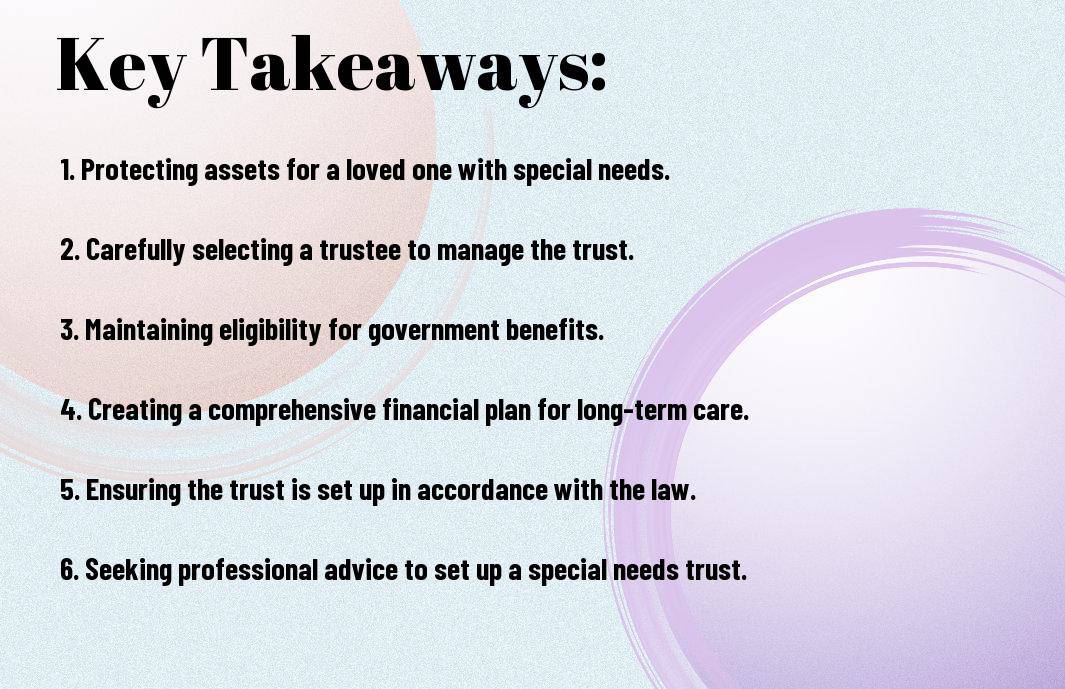Concomitant to effective financial planning is the establishment of a special needs trust for loved ones with disabilities. This vital legal arrangement ensures that individuals with special needs are provided for in the long-term, without jeopardising their eligibility for essential government benefits. It is imperative to comprehend the complex and perilous landscape of financial planning for individuals with special needs, and the establishment of a special needs trust is a crucial step in securing their future. In this blog post, we will explore the intricate details of setting up a special needs trust, from understanding eligibility criteria to selecting a trustee and funding the trust. By the end of this discussion, readers will have gained the necessary knowledge and confidence to navigate this critical aspect of financial planning for individuals with special needs.
Key Takeaways:
- Special Needs Trust: Setting up a special needs trust is crucial for ensuring financial security for a loved one with disabilities, as it allows for assets to be held and managed on their behalf without impacting their eligibility for government benefits.
- Professional Advice: Seek guidance from a financial planner or legal expert who specialises in special needs planning to ensure the trust is set up correctly and in compliance with relevant laws and regulations.
- Regular Reviews: It is essential to regularly review and update the special needs trust as circumstances change, such as changes in laws or the beneficiary’s needs, to ensure it continues to meet its intended purpose.

Establishing a Special Needs Trust
Defining a Special Needs Trust
A special needs trust is a legal arrangement that allows a person with disabilities to have funds set aside for their benefit without affecting their eligibility for government assistance programs such as Medicaid and Supplemental Security Income (SSI). The trust is managed by a designated trustee, and the assets in the trust can be used to supplement the individual’s needs beyond what government benefits provide.
Types of Special Needs Trusts
There are two main types of special needs trusts: first-party and third-party trusts. A first-party trust is funded with the disabled person’s own assets, such as an inheritance or a personal injury settlement. A third-party trust, on the other hand, is funded with assets belonging to someone other than the disabled individual, such as a parent or grandparent. The main difference between the two types is what happens to the remaining funds after the beneficiary’s death.
- First-party trust is funded with the disabled person’s own assets
- Third-party trust is funded with assets belonging to someone other than the disabled individual
The information should be broken down into
| Trust Type | Funding Source |
| First-party Trust | Disabled person’s own assets |
| Third-party Trust | Assets belonging to someone other than the disabled individual |
| Usage | Supplement the individual’s needs beyond what government benefits provide |
| Remaining Funds | Distribution after the beneficiary’s death |
It is crucial to understand the differences between these two types of trusts and how they can impact the beneficiary’s eligibility for government benefits. The establishment of the correct type of trust can make a significant difference in ensuring that the individual’s needs are met without jeopardising their access to essential support. It is advisable to seek legal and financial advice to navigate the complexities of setting up a special needs trust effectively.

Legal Considerations
When setting up a special needs trust, it is crucial to consider the various legal aspects involved. This includes complying with federal and state regulations, appointing a suitable trustee, and ensuring the trust is structured in a way that protects the beneficiary’s eligibility for government benefits.
Complying with Federal and State Regulations
Setting up a special needs trust requires strict adherence to both federal and state regulations. This includes understanding the eligibility criteria for government benefit programs and ensuring that the trust does not jeopardise the beneficiary’s entitlement to such support. Additionally, it is important to comply with specific state laws governing trust creation and management.
Role of a Trustee in Managing the Trust
The trustee plays a crucial role in managing the special needs trust and safeguarding the beneficiary’s interests. They are responsible for making financial decisions, overseeing trust assets, and ensuring that the trust is administered in compliance with legal requirements. It is essential to appoint a trustworthy and capable trustee who understands the complexities of special needs planning.
When selecting a trustee, it is important to choose someone who has a strong understanding of financial matters, legal obligations, and the unique needs of the beneficiary. The trustee must be prepared to fulfil their fiduciary duties with diligence and compassion, prioritising the beneficiary’s well-being above all else.
Funding a Special Needs Trust
Identifying Potential Funding Sources
When it comes to funding a special needs trust, there are various potential sources to consider. The most common funding sources include family contributions, life insurance policies, personal injury settlements, and inheritances. It is important to carefully evaluate each potential funding source to ensure it aligns with the specific needs and goals of the trust.
Additionally, government benefits such as Social Security Disability Insurance (SSDI) and Supplemental Security Income (SSI) can also be considered as potential funding sources for a special needs trust. However, it is essential to be aware of the impact these benefits might have on the trust, and to navigate the complex rules and regulations to ensure compliance.
Managing and Investing Trust Assets
Once the special needs trust is funded, it is crucial to have a solid plan in place for managing and investing the trust assets. This involves appointing trustees who are knowledgeable about the unique financial needs and challenges that come with managing a special needs trust. It is important for trustees to understand their fiduciary responsibilities and to make informed decisions when it comes to managing and investing the trust assets.
The primary goal of managing and investing trust assets is to ensure the long-term financial security and stability of the trust beneficiary. This involves creating a well-balanced investment portfolio that takes into account the need for growth, while also prioritising capital preservation to safeguard the trust assets from potential risks.
In managing and investing trust assets, it is crucial to seek professional guidance from financial advisors and legal experts who specialise in special needs planning and trust management. By doing so, trustees can ensure that they are equipped with the necessary knowledge and expertise to make sound financial decisions that align with the best interests of the trust beneficiary.
Utilizing the Trust
Once the special needs trust is established, it becomes a powerful tool for the financial well-being of the beneficiary. Proper utilisation of the trust is essential to ensure that the beneficiary’s needs are met while preserving their eligibility for government benefits.
Eligibility for Government Benefits
One of the key benefits of a special needs trust is that it allows the beneficiary to maintain eligibility for means-tested government benefits such as disability benefits and Medicaid. It is important to structure the trust in such a way that it does not affect the beneficiary’s eligibility for these crucial benefits. Improper distribution of trust funds could result in the loss of government benefits, so it is vital to seek professional advice to ensure compliance with the rules and regulations governing these benefits.
Making Distributions for Beneficiaries’ Needs
Another critical aspect of utilising the special needs trust is making distributions for the specific needs of the beneficiary. The trustee must carefully assess and approve any distributions, ensuring that they are used to supplement the beneficiary’s needs without impacting their eligibility for government benefits. Attention to detail and adherence to the guidelines set out in the trust document are essential to avoid potential negative consequences.
It is important to note that the trustee has a fiduciary duty to act in the best interests of the beneficiary and must exercise discretion when making distributions. Professional guidance can assist in navigating the complexities of making distributions from the trust and ensure that the beneficiary’s needs are met without jeopardising their financial stability.

Financial Planning – Setting Up a Special Needs Trust
In conclusion, setting up a special needs trust is a crucial element in financial planning for individuals with disabilities. It provides a secure means of holding and managing assets for the benefit of a disabled person, ensuring their long-term financial security and wellbeing. By addressing the specific needs and requirements of the disabled individual, a special needs trust can safeguard their eligibility for government benefits and provide for their ongoing care and support. It is essential to work with experienced professionals, such as financial advisors and attorneys, to navigate the complex legal and financial implications of setting up a trust. With careful planning and implementation, a special needs trust can offer peace of mind and a solid foundation for the future financial stability of loved ones with disabilities.
FAQ
Q: What is a Special Needs Trust?
A: A Special Needs Trust is a legal arrangement that allows a person with a disability to have funds set aside for their benefit without affecting their eligibility for government benefits.
Q: Why is a Special Needs Trust important for financial planning?
A: A Special Needs Trust is important for financial planning as it ensures that the needs of a person with a disability are taken care of without jeopardising their access to essential government benefits.
Q: Who can set up a Special Needs Trust?
A: A Special Needs Trust can be set up by a parent, grandparent, legal guardian, or the individual with a disability themselves, with the help of a qualified legal professional.
Q: What are the benefits of a Special Needs Trust?
A: The benefits of a Special Needs Trust include safeguarding government benefits, providing for the future care and needs of the individual with a disability, and ensuring peace of mind for the trustees and beneficiaries.
Q: How does a Special Needs Trust differ from other trust funds?
A: A Special Needs Trust is specifically designed to support individuals with disabilities without disqualifying them from government benefits, while other trust funds may not have the same protection.
Q: What are the different types of Special Needs Trusts?
A: There are two main types of Special Needs Trusts: first-party trusts, which are funded with the individual’s own assets, and third-party trusts, which are funded by someone other than the individual with a disability.
Q: How can I set up a Special Needs Trust?
A: To set up a Special Needs Trust, seek guidance from a legal professional with expertise in this area, gather all relevant financial information, and carefully consider the needs and preferences of the individual with a disability.
Newsletter
Subscribe our newsletter to get our
latest updates & news.
More Pages
Stay In the Loop
Signup to our FREE email bulletin, to keep you updated with the latest news, events, discounts and toys for Autism.







